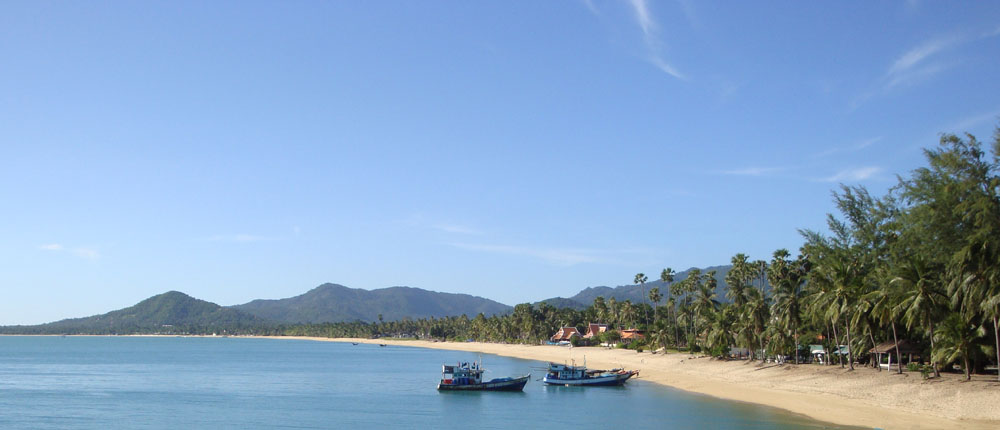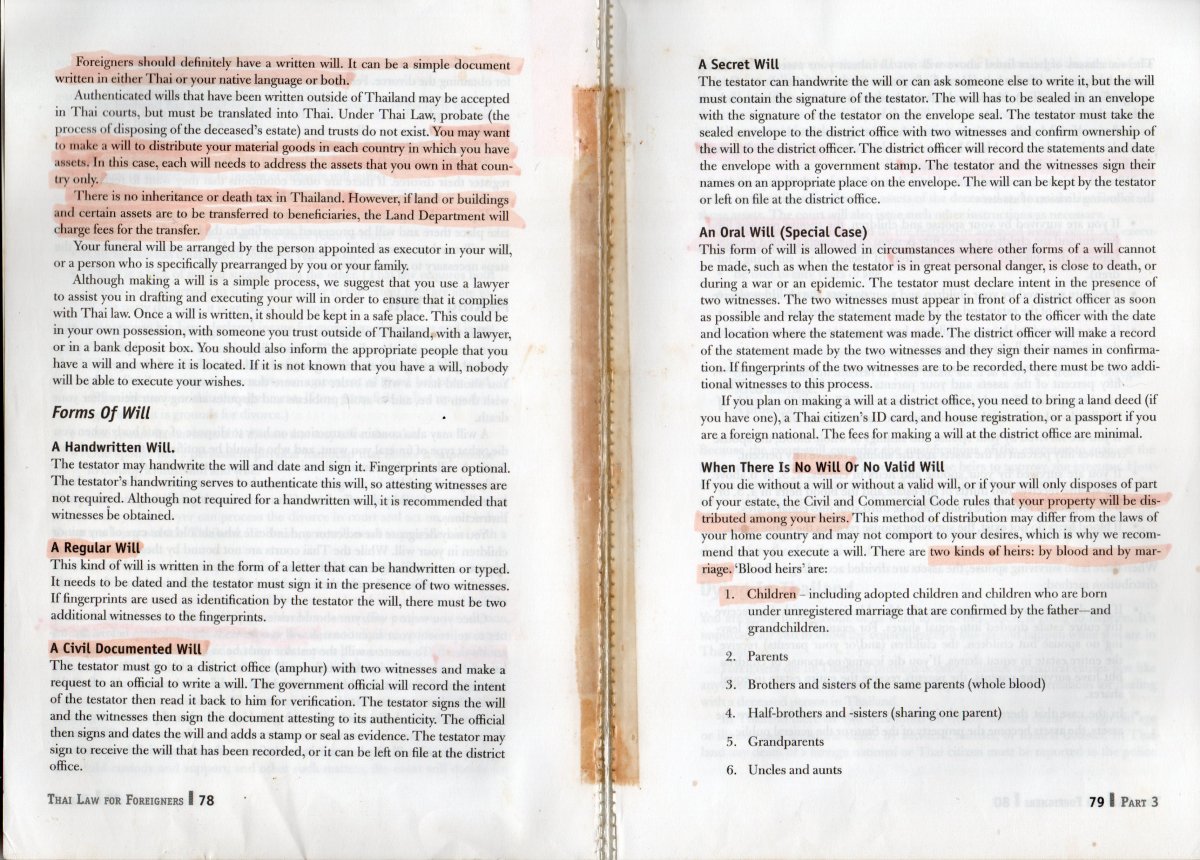-
Posts
12,522 -
Joined
-
Last visited
Content Type
Events
Forums
Downloads
Quizzes
Gallery
Blogs
Everything posted by khunPer
-
You can place a signature on each page. You don'y need natarization, even a handwritten will without witnesses can be valid. The importance is that someone can find your will, when you have moved on; that's the benefit of having a will notarized at the local amphor-district office and kept in file there. Your can read about Thai wills here, from the book Thai Law for Foreigners...
-
In reply to your situation. I was not married to the Thai mother of my daughter. However, we had and still have an excellent relationship – we are living together as family – so nothing to worry about in my case, wherefore no DNA-test and court approval. At the child's age of 7 years you can apply for a fathership certificate at the local amphor-district office. Child and mother needs to be present and both confirm the fathership. This certificate was in my case thereafter legalized and used for my daughter's citizenship in my European home country.
-

coming to thailand in february for 6 months
khunPer replied to parafareno's topic in Thai Visas, Residency, and Work Permits
Without visa you need a return ticket or a ticket out of Thailand, both within your allowed 60-days visa exempt stay. The airline might check your return- or onward flight upon check-in, if you don't have a ticket, you risk being denied boarding. -

Just one little drink a day may seriously affect your health
khunPer replied to Rimmer's topic in The Wellness Zone
Too many narrow studies, just one multi-vitamin per day is also fatal, according to a study. I agree with the scientists saying that 80-90 percent of all studies are junk-studies. Lots of other scientific studies state that a reasonable small amount – two glass/units per day for males, one for women – of alcohol is healthy. Probably, the most important for health and longevity is being happy...👍 -

TIN number and how do I apply for one.
khunPer replied to mickmac's topic in Jobs, Economy, Banking, Business, Investments
That is exactly what I'm saying, income from 1st January 2024 – no matter when it's earned, so no longer savings the following calendar year – income before that date are savings. -

TIN number and how do I apply for one.
khunPer replied to mickmac's topic in Jobs, Economy, Banking, Business, Investments
Nope, it's true facts and no other additions than the Thai tax officers begin to check if foreigners pay income tax, either at home or her. -

TIN number and how do I apply for one.
khunPer replied to mickmac's topic in Jobs, Economy, Banking, Business, Investments
Nope, I am retired. And I'm not "scaremongering", just extremely realistic; you can check my other replies above, I won't repost them here. -

TIN number and how do I apply for one.
khunPer replied to mickmac's topic in Jobs, Economy, Banking, Business, Investments
1) They were going to check all residents staying for more than 180 days, if they are paying their income tax, either to their home country or in Thailand. Easy information to get from Immigration and TM30-system. 2) Yes, overseas income was at that time taxable to Thailand – depending of what is agreed in the individual DTAs – if transferred within the same calendar year (tax year) as earned. The new thing is that from 1st January 2024 – not 2025, as you mention – any foreign income is income taxable in Thailand, no matter when it's earned. And yes, if you are transferring foreign funds – not proven savings from no later than 31st December 2023 – including withdrawals in ATMs with a foreign plastic card, they are taxable in Thailand, if not already taxed according to the individual DTAs. In news it is stated that they are almost all slightly different from country to country. With my home country, Denmark, for example, the DTA clearly says that "pensions are taxable in both states". A DTA means that you won't be double taxed, but the highest income tax will be valid. My home country's income tax is higher than Thailands – it begins at 38 percent, Thailand only goes up to 35 percent – so pension from my home country will not be further taxed in Thailand. However, Thailand can still claim income tax, but shall later refund it. Another and more easy legal Thai-possibility is, not to double-tax pensions. The Thai tax officers accepted the official statement I have from my home country's tax department that my pensions are taxable there. It might be wise to get a tax liability-statement from one's home country, for future income taxation questions. You can see an example of such statement here, the one from my home country... -

TIN number and how do I apply for one.
khunPer replied to mickmac's topic in Jobs, Economy, Banking, Business, Investments
The headline clearly says "overseas income"... -

TIN number and how do I apply for one.
khunPer replied to mickmac's topic in Jobs, Economy, Banking, Business, Investments
Things has changed in the last few years, so the 37 or 38 of your previous years don't count here. Unfortunately Thailand needs more tax income – just read the news – foreigners might be a source for income tax. They started with a couple of countries – Denmark and Finland – which are easy to exchange tax-information with, as stated in DTAs, and clear agreements of taxable income. -

TIN number and how do I apply for one.
khunPer replied to mickmac's topic in Jobs, Economy, Banking, Business, Investments
Yes, I was also surprised. The reason was to show it to me was that they had a lot of people to visit, not only me. Another country fellowman posted that he had also been shown the list and even counted the number of names; the were more resident folks from our mutual home country living in the area than we expected. -

TIN number and how do I apply for one.
khunPer replied to mickmac's topic in Jobs, Economy, Banking, Business, Investments
It happened also other places in Thailand. They check by country due to different DTAs. -

Furniture/Personal Possessions/Container From UK
khunPer replied to MangoKorat's topic in General Topics
Yes, as answer to your first question. When I shipped my goods from Europe (not UK), my shipping agent advised to to ship a whole container – in myh case only 20-feet – instead of parcels, as it would be both safer and cheaper. He said, I should ship c.i.f. Bangkok and get a local agent to do the custom clearence and thereafter move the container to it's final destination. Furthermore, take a "total loss" insurance, but not partial damage, as that would be both expensive and difficult to claim compensation for any damage. A detailed packing list with values is a must. Check the Thai customs homepage for presently required details and what is not allowed as household. I had a successful shipping and low custom clearance and final delivery costs...👍 However, recently a fellow countryman used a door-to.door shipping with one of the major companies, and it was also reasonable priced and worked well. Things might have changed with custom clearence, so you don't anymore need a local agent that know the custom officers and if they need some little extra money for their afternoon-tea...😉 -

TIN number and how do I apply for one.
khunPer replied to mickmac's topic in Jobs, Economy, Banking, Business, Investments
Indeed foreigners discuss TIN and income tax in other forums than AN and in other languages than English, I know of both German and Danish. And by the way, tax officers also visits foreigners in person to check that they pay their income tax, either at home or here in Thailand. I've had a visit, and so have the more than 20 other country fellows where I live; the tax officer showed me the list with expat-names to visit. I luckily had my stuff in perfect order, they said, but they were shocked over how much tax I pay at home. So, now you are warned, if you stay in the Kingdom for more than 180 days within a tax-year, because then you might have an unannounced tax-visit... -

TIN number and how do I apply for one.
khunPer replied to mickmac's topic in Jobs, Economy, Banking, Business, Investments
And I take you don't read the AN-news, which states that foreigners need to file a tax return...😉 -

TIN number and how do I apply for one.
khunPer replied to mickmac's topic in Jobs, Economy, Banking, Business, Investments
The local custom office will issue you a TIN; often same office that do vat-registration. You need your passport and photocopies of name page; entry stamp; visa page and eventual present extension of stay-stamp. Now, when foreigner's need to file a tax return, they will probably not ask any questions; before, at some places they would ask why you need a TIN and wish proof of taxable income. -

Phuket Struggles with Escalating Waste Woes: A Call for Action
khunPer replied to webfact's topic in Phuket News
That's what happens, if you so much want mass tourism and don't have the infrastructure in order first... -

Phuket netizens slam half-naked foreign man on red baht bus
khunPer replied to webfact's topic in Phuket News
I'm getting (too) old, because I don't see what's fun in doing that, I even sometime see youngsters doing it in a night club...😟 -

Yellow House Book and Pink Card
khunPer replied to Hocus Pocus's topic in Thai Visas, Residency, and Work Permits
If you own the condo in your name, you should be "host" and the person that can allow others to be registered in the house book, including yourself, who as foreigner will be listed in a separte yellow house book for aliens. You shall contact the local tessa ban-office and ask if your name is registered as host, and what they require of documentation for register you in a house book. The requirement are slightly different from province to province, but you normally need a certified translation of your passport's name page and two witnesses.









